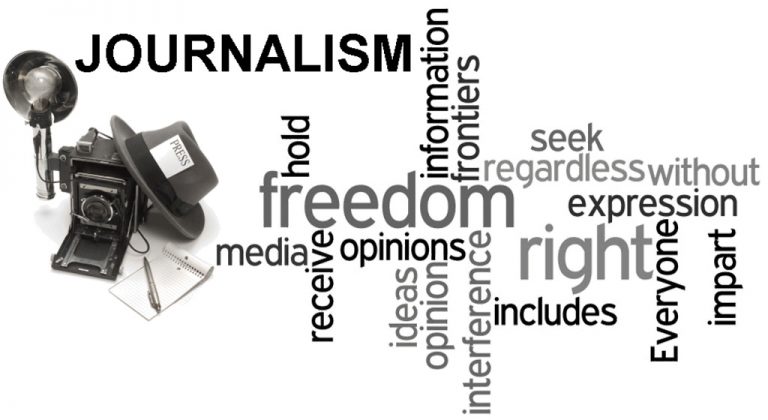The truth behind reporters’ sources
One thing the Main Stream Media rightfully gets criticized for is the use of anonymous sources. If you want a better understanding of journalism, here’s an explanation of sourcing.

Sources are those who provide information to reporters for news stories. If you think about it, most news stories are built on platforms of information provided by sources.
Reporters may initiate stories, but they are dependent on sources to provide data, detail, and fact.
Sources are frequently the government — information shared by everything from the Census, to the Department of Revenue, to State, Defense, HUD, Education, and so on. In addition to the government, reporters receive information from think tanks, industry groups, political organizations, universities, scholars, scientists, unions, various experts, and so on. It’s a long list.
None of this information should be accepted without question, but it often is. In most cases, organizations like those I mentioned, or their executives or spokespeople, are willing to be quoted by name.
Why use these sources? Because reporters are trained to get information from authority, which makes sense (although authority sometimes has reason to shade the truth).
A source willing to be quoted by name, and thereby willing to face any argument or challenge, is more believable than one that refuses to be identified.
Back in the ‘50s, most people were willing to be quoted by name, and not just because the media was more highly regarded then. Times were different, simpler.
Starting in the ‘60s, I believe things began to change as a direct result of a loss of trust in government and other institutions.
That’s when anonymous sources first started cropping up, after many decades of newspapers refusing to use them. Previously, if a reporter came to an editor with a story underpinned by an anonymous source, the editor would say, “Get him to use his name or find someone who will let his name be used.”
That changed over time because more sources became afraid if they spoke on the record, giving their names, they might suffer repercussions ranging from warnings, to firing, to prosecution.
I just used the phrase “on the record.” There’s also “off the record” and “not for attribution” or “on background.”
Here’s what these terms generally mean.
On the record means the information can be directly quoted, and the name and title of the person providing it can be used.
Off the record means the information can’t be used, it is only for the edification of the person hearing it. Some people — including some journalists — confuse it with
Not for attribution, which means the information can be used, but the person providing it can’t be named. You see this all the time when you read, “A high government official says that….” or “A Department of Revenue spokesman said…”
When government started dropping named sources, during the Richard Nixon era, The New York Times reportedly retaliated by using this: “A State Department official, speaking in a German accent, yesterday said…” The mention of the accent was to identify Secretary of State Henry Kissinger, without using his name, thus obeying the “no name” rule.
On background provides information on a situation for the journalist, who uses the background details to help him or her construct a deeper story in his or her own words.
As mentioned, for a long time newspapers wanted named sources, but eventually accepted unnamed, or anonymous, sources, but demanded at least two.
Now it might be only one, especially if the one person is well placed with a record of reliability.
The promise of anonymity should not be given lightly, although it sometimes is. To me, the promise is negated if the source provides information knowing it is untrue, but it is often hard to figure out if the source was a knowing liar.
Editors sometimes will ask reporters to identify their sources so they can evaluate the credibility of the material.
At the Philadelphia Daily News, which was never a typical newspaper, my editor asked on rare occasion, “Do you have complete trust in the source?”
On only one occasion did he ask the name of the source, because the topic was explosive. I provided it with the understanding he would share it with no one else.
When questions persist, reporters can fall back on a blind item, more often used by columnists, especially gossip columnists, than by news reporters. In a “blind item,” the subject is not named. Such as, “The star of an NBC series is about to face charges of sexual molestation, say informed sources at the network.” In this example you have a “blind item” provided by anonymous sources.
There have been a handful of reporters who gamed the system, lied to their editors and ran stories that were fiction.
Maybe the most famous was Janet Cooke, a Washington Post reporter who wrote a Pulitzer Prize-winning story in 1981 about an eight-year-old heroin addict named Jimmy.
It was a lie, she had invented Jimmy, and the Pulitzer was returned. Her editors made the mistake of falling in love with the story and suspended their professional suspicion.
In 1998, the career of The New Republic writer and associate editor Stephen Glass exploded when it was learned that he had fabricated, in whole or part, 27 of the 41 stories that he wrote for the magazine. Editors there, likewise, ignored the adage that stories too good to be true probably are not true.
Another fabulous fraud was Jayson Blair, fired from The New York Times in 2003 when the newspaper discovered Blair had plagiarized a number of his stories from other sources.
Importantly, the violation of journalistic standards were discovered and revealed by other journalists.
Journalism is an occupation where practitioners will happily cast out the bad apples.
Real journalists hate “fake news” even more than you do.



